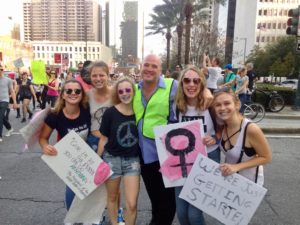My time so far working with NOAF has been an amazing positive experience. I’ve been dedicating a lot of my time to reading up on the restrictions to abortion access in Louisiana and the south, as well as some of the challenges faced by abortion clinics in the south, such as aggressive protestors and TRAAP laws. One of the coolest things I’ve done so far was go to a clinic escort training, in which it was explained to me the difficulty of standing strong and silent despite protesters trying to provoke a reaction from both the escorts and the patients walking inside. I haven’t yet taken a shift as an escort yet, but I’m looking forward to the experience of seeing first hand the bravery it takes for a woman to walk right past a group that adamantly deplores her decision to her face.
I’ve also been taking full advantage of the many events within the New Orleans feminist community, such as the screening of the film, Jackson, sponsored by NOAF, as well as enjoying the literature that I get to read in order to educate myself more on the issues and legal barriers against which we fight. I often take notes and journal my thoughts as I read–something that I too often neglect to do in my daily school work–and it helps me absorb and connect more to the underlying sentiment and logic. For example, in my journal I wrote,
“To be pro-choice does not mean that you would get an abortion yourself; nor does it mean that you would full-heartedly support a friend or another woman’s decision to get an abortion 100% of the time, or even most of the time. To be pro-choice only means that you believe women should have the option–that a woman’s decision as to whether or not she will be pregnant and stay pregnant is of that woman and no one else; not the government, not society, not her family nor her partner. You don’t need to morally approve of abortion to feel that it is unjustly overbearing of our government to prevent the option of abortion from being available at all.”
Something that I’ve learned is that the term “pro-choice” carries a lot of connotations with it, many of which stem from the political debate between conservative and liberal groups. I think in confronting the problem of access to abortion it’s important to circumvent black and white political debate and change the kind of conversations that we have about abortion. I’ve come to this conclusion in large part because of the many abortion stories I’ve been listening to on The Abortion Diary podcast, which helps to dispel stereotypes associated with abortion by allowing diverse women to share their unique experiences.
In a couple of weeks I will have my first “house party” to chat about abortion and try to break down some of the assumptions we make when talking about this issue. Abortion doesn’t need to be a touchy subject–its just women’s health care!

